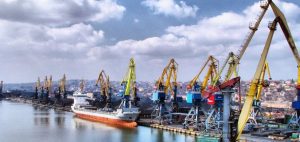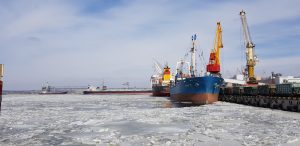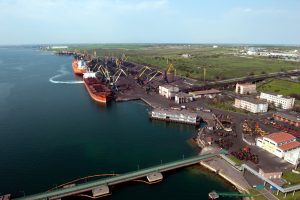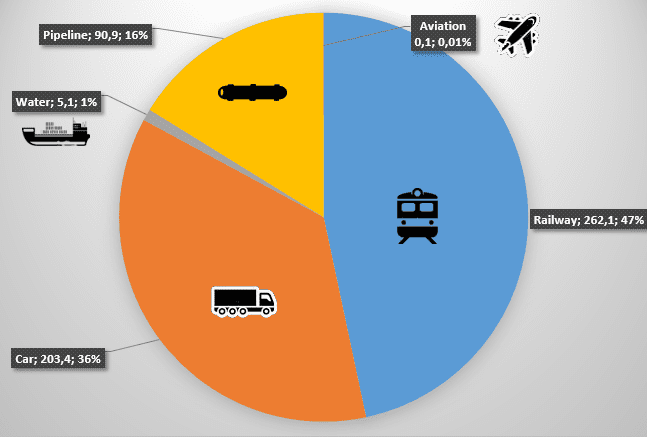
Mariupol seaport (Donetsk region) increased cargo handling by 23.4% in January-May 2020 compared to the same period in 2019, to 2.687 million tonnes.
According to the statement of the Ukrainian Sea Ports Authority on the state-owned enterprise’s website, during the period the port increased the transshipment of export cargo by 15.5%, to 2.238 million tonnes, import by 28.7%, to 303,620 tonnes, coastal freight by almost 56 times, to 145,100 tonnes. At the same time, the port did not handle transit cargo.
According to freight nomenclature, Mariupol seaport increased the transshipment of dry bulk cargo by 42.8%, to 827,700 tonnes, and packaged goods by 17.4%, to 1.783 million tonnes. At the same time, it reduced the transshipment of bulk cargo by 2.6%, to 76,000 tonnes.
As reported, the port handled 6.484 million tonnes of cargo in 2019, which is 10% more than in 2018.

In January-April 2020, the seaports of Ukraine handled more than 55 million tonnes of cargo, which is 12.6% more compared to the same period in 2019.
According to the statement of the Ukrainian Sea Ports Authority on the state-owned enterprise’s website, traditionally, the leaders in transshipment are grain and ore.
Over the indicated period 18.7 million tonnes (5% more) of grain and 13.8 million tonnes of ore (30.5% more) were handled.
Handling of coal doubled to 2.5 million tonnes and that of crude oil increased by five times to 800,000 tonnes. Transshipment of containers by Ukrainian ports amounted to 357,700 TEU (up by 17.2%).
According to the Sea Ports Authority, handling of exported cargo increased due to a rise in transshipment of grain to 18.2 million tonnes (by 5.3%), iron ore to 10.9 million tonnes (by 45.4%), oil to 2.2 million tonnes (by 8.8%).
Transshipment of imported cargoes increased due to a rise in handling coal to 2.3 million tonnes (by 106.9%) and crude oil to 500,000 tonnes (by 213.6%), and oil products to 400,000 tonnes (by 233.3%).
Transit transportations increase due to a rise in handling ore to 1.1 million tonnes (by 34%) and crude oil to 400,000 tonnes.
Four seaports led in terms of cargo handling: Pivdenny, Mykolaiv, Chornomorsk and Odesa. In general, they processed 47.7 million tonnes of cargoes, which is 87% of the total volume of cargo handling by Ukrainian seaports.

Nika-Tera sea terminal (Mykolaiv), part of Dmytro Firtash’s Group DF, handled 2 million tonnes of cargo from January 1 to April 10, 2020, the company said on Facebook.
“After 49,000 tonnes of Ukrainian corn for export had been loaded on board the Panamax GRIZZLY, on April 10 Nika-Tera port’s cargo turnover amounted to 2 million tonnes from the beginning of 2020. This batch of corn is sent by Louis Dreyfus to Spain,” the report says.
The GRIZZLY bulk carrier was loaded at the eleventh berth of the port simultaneously with two loading machines, which allowed Nika-Tera to achieve a daily loading rate of 36,000 tonnes.
According to the company, in the first quarter of 2020, Nika-Tera’s cargo turnover amounted to 1.87 million tonnes, which is 1.5% more than in the same period last year.
In general, in the first three months of operation, the port handled 85 vessels, including two bulk carriers with additional loading at the roads, as well as four tankers with sunflower oil.
In the structure of cargo turnover, the main cargo remains cereals, legumes and oilseeds, which accounted for 65% of the quarterly transshipment volume or 1.22 million tonnes. Bulk cargo amounted to 14% or 270,000 tonnes, meal some 17% (320,000 tonnes), and oil transshipment some 4% (70,000 tonnes).

Odesa seaport handled 4.26 million tonnes of cargo in January and February 2020, which is 7.31% more than in the same period in 2019.
According to the Ukrainian Sea Ports Authority, for the specified period, the port increased the transshipment of exported cargo by 9.86% compared to January and February 2019, to 3.316 million tonnes, the transshipment of imported cargo by 4.04%, to 743,000 tonnes, reduced transshipment of cabotage goods by 14.4%, to 200,850 tonnes. The transshipment of transit cargo decreased by 52.5%, to 1,830 tonnes.
Transshipment of liquid cargo in Odesa seaport in January and February decreased by 37.21%, to 184,330 tonnes, dry and bulk cargo by 1.03%, to 1.643 million tonnes, and piece-by-piece increased by 20.56%, to 2.443 million tonnes.
Processing of containers for the period amounted to 109,244 TEU (an increase of 21.56% compared to the same period in 2019).
As reported, in 2019, the seaport handled 25.344 million tonnes of cargo, which is 16.8% more than in 2018.
The port serves ships up to 270 meters long and a draft of up to 13 meters. The total length of the mooring line is more than 8 km.
Odesa seaport is located in the southwestern part of Odesa Bay on an artificially created area of 109.5 hectares.
The port serves ships up to 270 meters long with a draft of up to 13 meters. The total length of the mooring line is more than 8 km.

Pivdenny maritime merchandise port in January 2020 handled 4.608 million tonnes of cargo, which is 28.45% more than in January 2019.
According to information from the Ukrainian Sea Ports Authority, for the period the port increased transshipment of exported cargo by 9.4%, to 3.125 million tonnes, imported freight by 2.5 times, to 0.877 million tonnes, transit by 56%, to 0.606 million tonnes.
The port did not handle coastal cargo in January.
In January 2020, the port raised transshipment of liquid cargo by 16.76%, to 0.414 million tonnes, dry bulk cargo by 41.18%, to 3.91 million tonnes, and reduced transshipment of packaged goods by 38.7%, to 0.284 million tonnes.
Container transshipment amounted to 18,380 TEU (an decrease of 2.49% compared to the same period in 2019).
As reported, the port handled 53.862 million tonnes of cargo in 2019, which is 26.1% more than in 2018.
Volumes of cargo transportation in Ukraine in Mln tons.
